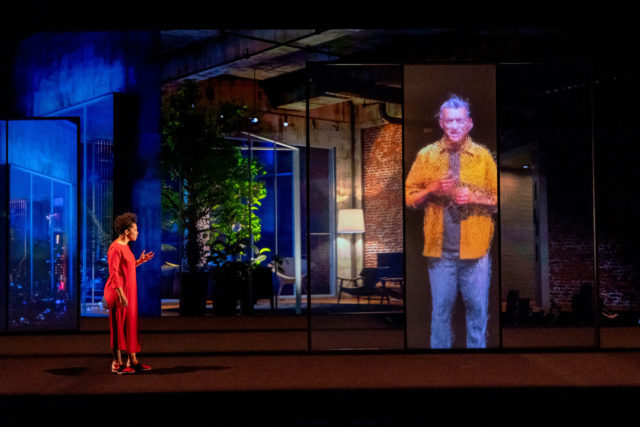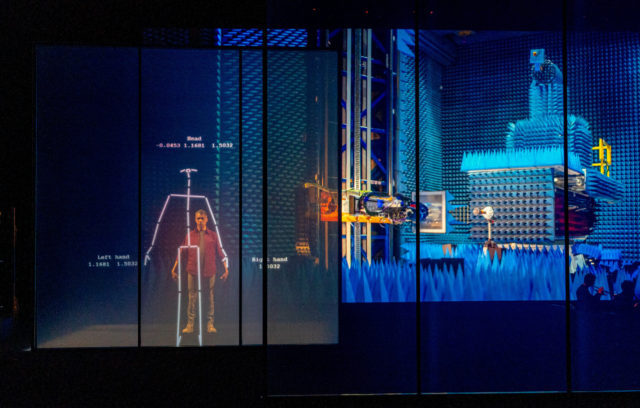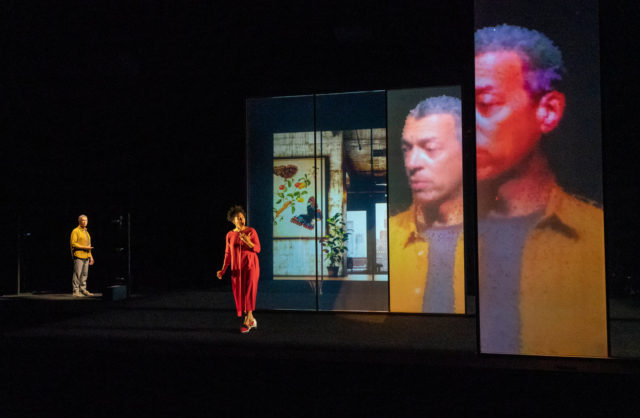
Soprano Julia Bullock and baritone Roderick Williams portray a daughter and father dealing with a digital afterlife in Upload (photo by Stephanie Berger)
UPLOAD
Park Ave. Armory, Wade Thompson Drill Hall
643 Park Ave. at Sixty-Seventh St.
March 22-30, $45-$150, 7:30 / 8:00
www.armoryonpark.org
www.vanderaa.net
Created specifically for Park Ave. Armory’s massive Wade Thompson Drill Hall, Dutch composer Michel van der Aa’s multimedia opera Upload is a haunting adventure into a near-future where people can choose to surrender their corporeal bodies and exist for eternity as digital beings. The process involves scanning the brain to make a map of the mind, implanting in the upload their family, social, and personal identities, pushing pain and trauma into the background.
The ninety-minute production begins in total darkness as a father (baritone Roderick Williams) and his daughter (soprano Julia Bullock) share many of the elements that make life unique; phrases such as “light – smile,” “struggle – grip,” “tingle – cheek,” “seek – calm,” and “carry – loss” emerge from speakers placed all around the drill hall. The darkness lifts to reveal lighting and set designer Theun Mosk’s stunning stage, which features three movable, translucent triptych screens in front of a larger movie screen. In the far right corner sits Ensemble Musikfabrik, an eleven-piece orchestra conducted by Otto Tausk; the powerful, immersive sound design, by Tom Gelissen and Paul Jeukendrup, lets van der Aa’s wonderful score, which often turns into scratchy electronic noise, echo gloriously in the cavernous space.
The daughter, in a red jumpsuit, converses with her father, who appears on the movable screens, wearing jeans and an unbuttoned shirt; his image is often blurry or pixelated, indicating the transmission is murky. Williams is actually performing from stage right, a camera projecting him onto the screens. The effective motion capture and graphics are by Darien Brito, with special effects by Julius Horsthuis.

A man is getting scanned to become a digital upload in Michel van der Aa’s multimedia opera at Park Ave. Armory (photo by Stephanie Berger)
The daughter is furious that her father has chosen to become an upload without consulting her; he assures her that he hasn’t left her. “Sweet smile of my child, / I still hear, / I see without knowing that I see. / It’s easier to feel than to explain. / My sense of touch is gone, / but no matter. / I can still think my own thoughts. I went on a journey to be what I must be. / I made this decision for us; / you can no longer lose me. . . . If you can’t live the way you want, there’s no point in living.” She angrily asserts, “Why didn’t you ask how I would feel about all this?”
The moments between father and daughter, which include footage of their home and garden projected onto the back screen, alternate with prerecorded scenes from the clinic that invented the procedure, from a sterile waiting room and laboratory to a fantastical Lego-like structure in shocking blue. The dialogue at the clinic is spoken, not sung. A psychiatrist (Katja Herbers) explains, “I think that what we do here can be regarded as a form of rebirth, analogous to the afterlife. I mean, haven’t we always tried to cheat death?” The smarmy CEO (Ashley Zuckerman) posits, “In the past, when a generation died, we would lose their collective wisdom. And that’s a great loss. . . . By digitizing the mind, removing it from the body, we’re removing it from these risks. Take one last trip in your biological body, and then you’ll live forever. . . . You just have to die first.”
The key to the transfer is a “memory anchor,” something the person being uploaded can think about to make the procedure go smoothly. The CEO notes that “memories are faulty,” but he believes that, technologically, the anchor “will always be reliable.” But as the daughter later tells her father, “No world they created for you can compete with the real one.”
Previously presented at the Dutch National Opera and the Bregenz Festival in Austria, Upload is like a live production of the popular anthology series Black Mirror directed by Ivo van Hove, along with a dash of the Amazon Prime show similarly titled Upload, which also involves a digital afterlife. Van der Aa previously explored what happens following death in his 2006 piece After Life, adapted from the film of the same name by Hirokazu Kore-eda; the opera featured Williams in a way station between heaven and hell.

Upload features dramatic staging at the armory (photo by Stephanie Berger)
The interplay between the live and prerecorded flashbacks, shot by cinematographer Joost Rietdijk, builds off the tension being experienced by father and daughter onstage; as the characters, sometimes assisted by others, push the vertical triptychs back and forth, the films depict nonstatic scenes outdoor, indoors, and underwater, the movement in multiple directions resulting in an uneasy 3D-like effect that matches the emotional mood of the narrative.
Bullock (Girls of the Golden West, Doctor Atomic, Zauberland) and Williams (Eugene Onegin, Billy Budd, Madam Butterfly) sound glorious together; I would have loved to have heard more from them. While there are English subtitles, you won’t need them for his vocals, which are sharp and pristine.
Written, composed, and directed by van der Aa — who was last at the armory with 2017’s Blank Out, in which Williams appeared onscreen in a story loosely based on the life and career of bilingual South African poet Ingrid Jonker — Upload can be confusing at times, but the overall production, complete with a breathtaking surprise near the end, is a genuine treat, a thrilling peek at the potential future of humanity while testing the boundaries of what opera can be.